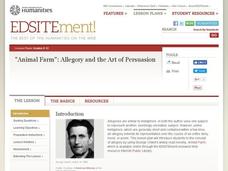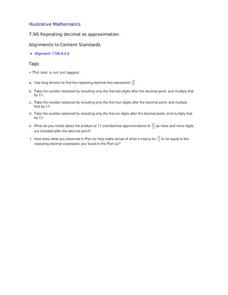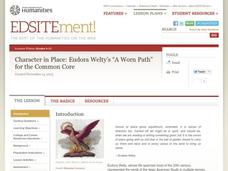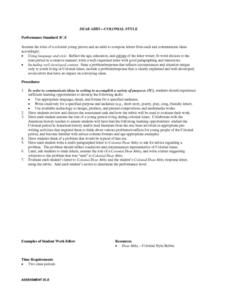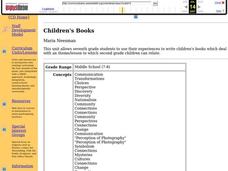National Endowment for the Humanities
Animal Farm: Allegory and the Art of Persuasion
Introduce your class members to allegory and propaganda with a series of activities designed to accompany a study of George Orwell's Animal Farm. Readers examine the text as an allegory, consider the parallels to collective farms...
BioEd Online
Muscles and Bones in Space
Being an astronaut takes not only high mental acuity, but also a high level of physical fitness, especially for those who spend a long amount of time away from Earth, such as the astronauts serving on the International Space Station....
Baylor College
Energy for Life (Energy from Food)
Energy comes in many forms, but how do living things get the energy they need to survive and thrive? In a simple, controlled experiment with yeast, water, and sugar, groups make observations about how yeast reacts with water alone, then...
Curated OER
Repeating Decimal as Approximation
You are used to teaching repeating decimals with bar notation that keeps us from writing that number over and over again; now teach what the over and over again represents. This activity allows your mathematicians to explore the infinite...
NPR
Same-Sex Marriage
The battle over same-sex marriage is a prevalent issue in the United States, and a valuable topic to be discussed in your social studies classroom. Here is a basic outline of introductory questions, focus questions, vocabulary, and media...
National Endowment for the Humanities
Character in Place: Eudora Welty’s “A Worn Path” for the Common Core
How do writers use the interaction between elements like characterization and setting to create meaning? Readers of "A Worn Path" create a series of comic book-style graphics of Eudora Welty's short story and reflect on how Welty...
Carolina K-12
Minnesota v. White: Exploring a Judicial Candidate’s First Amendment Rights
After watching a documentary on the Supreme Court case Republican Party of Minnesota v. White, class members research how the First Amendment and free speech issues influence judicial elections and then conduct a mock judicial election.
K12 Reader
Proverbs and Adages: What Do They Mean?
You shouldn't judge a book by its cover, but feel free to find the silver lining in a worksheet about common proverbs and adages. Learners read six popular adages and write their literal definitions on the lines provided.
Simon & Schuster
Curriculum Guide: The Scarlet Letter
The Scarlet Letter may be a classic, but keeping high schoolers engaged in the reading of Hawthorne's vocabulary, syntax, imagery, and historical references presents it own set of challenges. Here's a guide that offers readers...
K12 Reader
Change the Point of View: Third Person to First Person
Use Jack London's The Call of the Wild to help young writers learn the difference between first and third person points of view. After they read a passage from the novel, they rewrite it in the first person point of view.
Science Matters
Plot Study
Small groups investigate plots of land to discover how abiotic and biotic factors interact. After recording their findings, scholars share observations with peers and self-reflect on the learning process.
US Institute of Peace
Taking a Step Toward Peacebuilding
What can someone do to increase the peace? Pupils take small steps toward a big peacebuilding role in the final lesson plan in a 15-part unit. Individuals identify their roles as a peacebuilder and create a stepping stone that reflects...
Roald Dahl
The Twits - The Wormy Spaghetti
What do spiders' legs and an octopus's eyeball have to do with metaphors? The fourth lesson in an 11-part unit designed to accompany The Twits by Roald Dahl uses disgusting foods to teach about metaphoric writing.
Institute for Humane Education
In Your Face: Reclaiming Billboards
Ads here, ads there, ads everywhere—but what do they communicate? Pupils discuss this topic and develop a list of personal values. They then work as creative directors at an advertising firm to create billboards that reflect community...
WE Charity
Activity: Exploring the Four Leadership Styles
Mahatma Gandhi, Nelson Mandela, and Mother Teresa were some of the greatest leaders of all time; what made them so great? Scholars discover the qualities of effective leaders using teen leadership activities. Learners complete an...
Workforce Solutions
Survivor Island
Decisions, decisions! Small groups decide on their dream career then enter a scenario that challenges them to make another big decision—if stranded on a deserted island, who would be saved or fed to the sharks. Because decisions are...
Lions Clubs International Foundation
Mindful Self-Awareness Exercise: Identifying Feelings
Young scholars identify feelings through facial expressions and body language. Learners listen for a feeling word, then act it out and discuss how they portrayed it.
Curated OER
Dear Abby- Colonial Style
Students review the Colonial period in American history and read literature from this era. They assume the roles of a colonial young person and an adult to compose letters from each and communicate their ideas through the letter writing...
Curated OER
The Time I Got Lost
Third graders go through the writing process but substitute paper and pencil with the computer to create a story about "The Time I Got Lost".
Curated OER
Lesson 5: Publication After the Interview
Students lear about the publishing/writing process such as the outline, rough draft, MLA Guide for listing sources, and evaluating, revising, and proofreading.
Curated OER
What Kind of Student Do You Want to Be?
Third graders write an essay which answers the question, "What kind of student do you want to be?"
Curated OER
Children's Books
Young scholars explore daily dilemmas students face. They write and illustrate a story book dealing with one dilemma. Young scholars write reviews of their books. They read their books to second grade students. Additional cross...
Curated OER
Ode to the Ordinary
Ninth graders identify an ordinary object and write an ode for the subject. In this poetry writing instructional activity, 9th graders select an ordinary object and define its uses. Students then write an ode for the poem.
Curated OER
Here's an Instant Activity for February 19, 2007
Sixth graders complete a writing sentences activity using words that contain Latin roots. In this Latin roots lesson, 6th graders write words containing Latin roots. Students then write the words into sentences.
Other popular searches
- Self Reflective Writing
- Writing Reflective Essay
- Reflective Writing Creative
- Reflective Writing Topics
- Reflective Writing Prompts
- Reflective Writing on Self
- Writing a Reflective Essay
